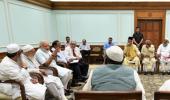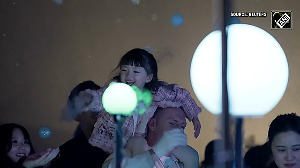 Triple talaq is the ‘worst’ and ‘not a desirable’ form of dissolution of marriage among the Muslims, even though there were schools of thought that called it ‘legal’, the Supreme Court observed on Friday.
Triple talaq is the ‘worst’ and ‘not a desirable’ form of dissolution of marriage among the Muslims, even though there were schools of thought that called it ‘legal’, the Supreme Court observed on Friday.
The second day of the day-long hearing on the matter also saw two veterans, jurist Ram Jethmalani and former Union Minister and Islamic scholar Arif Mohammad Khan, coming out all guns blazing against the practice of triple talaq.
A five-judge constitution bench headed by Chief Justice J S Khehar said there are ‘school of thoughts (which) say that triple talaq is legal, but it is the worst and not a desirable form for dissolution of marriages among Muslims’.
The remark was made by the bench when senior lawyer Salman Khurshid referred to the various schools of thought and the stand of All India Muslim Personal Law Board that triple talaq was ‘abhorrent’, yet valid.
While Jethmalani attacked the practice on various constitutional grounds including the right to equality and termed it ‘abhorrent’, Khan said it was akin to the pre-Islamic era practice of burying a female child alive in the Arabian region.
Khan, who had quit Rajiv Gandhi’s cabinet over differences in handling the Shah Bano case, was at his best while representing All India Muslim Women Personal Law Board.
He said the whole Shariat law has been distorted as ‘Shariat is the Holy Quran and not the opinion of these people (clerics). The Holy Quran considers the importance of family and it provides four steps before pronouncement of divorce’.
“Triple talaq is far from being fundamental and very far from being sacramental to Islam. It violates every good thing which Islam prescribes. What we are seeing in the form of triple talaq is similar to the pre-Islamic era practice where female infants were buried alive,” Khan told the bench which also comprised Justices Kurian Joseph, R F Nariman, U U Lalit and Abdul Nazeer.
Marriage is the only aspect which is extensively dealt in holy Quran that lays down the procedure for divorce, and various schools of thought have distorted the tenets of the holy book ‘to their liking’, he said.
“Everything you need is in the Quran. If you need more, then look at the life of the Prophet and if you still need more, then use your own good sense,” he said.
“We can change the law, but not the habits of the society. Untouchability was banished by the Constitution, but it stays with us,” Khan said.
Jethmalani said ‘the right of triple talaq is available only to the husband and not to the wife and it breaches the Article 14 (Right to Equality) of the Constitution’.
“There is no saving grace for this method of granting divorce. One-sided termination of marriage is abhorrent and avoidable,” he said, adding that Article 15 of the Constitution prohibited discrimination on the grounds of religion, race, caste, sex or place of birth.
It is a settled proposition that a law can be made to improve the situation of women and not to deprive them of their rights, he said.
The bench intervened and said it was not dealing with the state laws, but rather discussing personal law.
Jethmalani said triple talaq was a discrimination on the ground of sex and this practice was abhorrent to the tenets of holy Quran and no amount of advocacy can save this ‘sinful’ practice which is contrary to constitutional tenets.
How can a woman be allowed to become ex-wife only because her husband wants and this is ‘the highest kind of unconstitutional behaviour’, the noted jurist said.
He said that all laws have to be in conformity of the constitutional provisions and the pre-Independence era Act on Muslim marriage has to be made applicable to all Muslims, irrespective of sects.
The bench then said that the law cannot be made applicable to all sects of Muslims and observed: “Can Hanafi law be made applicable to Shias. The answer is ‘no’”.
Jethmalani then referred to the constitutional provisions, saying the state shall endeavour to make the Uniform Civil Code and the present issue should be considered in that light.
He said there were political differences in achieving UCC but while dealing with the issue of husband and wife, the court should keep the constitutional scheme in mind. Khurshid, who is assisting the court in personal capacity, said he himself found triple talaq ‘sinful’ and anything which is sinful could not have been ordained by Islam.
He also reiterated that triple talaq was a ‘non-issue’ which does not require judicial scrutiny.
At the outset, he said AIMPLB was also of the view that practice of triple talaq is abhorrent but valid and they were working hard to ‘discourage people’ from practising it.
Khurshid said the irrevocable nature of triple talaq can be negated if the three-time pronouncement of talaq in one go is considered one leaving the scope for reconciliation and re-union during the iddat (waiting) period.
Referring to the prevalent practice in Islamic nations, he said even if one says talaq thrice in a go, it was considered as one, thus negating the irrevocability of divorce.
To this, the bench asked Khurshid how extensive was the use of triple talaq outside India.
Triple talaq is hardly practised in any other country and was only prevalent among Indian Muslims, he said.
“If thrice pronouncement of talaq is considered once, then 90 per cent of the problem which is created by instant divorce in one sitting would be solved. If triple talaq is taken as only one talaq, then it would lose irrevocability and allow reconciliation efforts among couples during the three-month iddat period,” he said.
The bench asked Khurshid if triple talaq was India-specific and what had led to its repeal in other countries.
Khurshid said whatever was happening in India now, might have happened in other countries, leading to the ban.
To this, the bench said, “It is like death penalty which is abhorrent but permissible in the law of many countries and many have repealed it.”
Khurshid said personally he found triple talaq ‘sinful’ and believed that anything sinful could not have been part of Islam or Shariat.
The bench then asked whether anything which is sinful be taken as prescribed by God and made a law by man.
Responding to a query as to which sects practiced triple talaq, he said, “Sunnis who are 90 per cent Muslims in India accept the practice of triple talaq and Shias who are only 10 per cent do not accept this form of talaq.”
During the hearing, the bench observed, “If triple talaq is part of Shariat, that means they (schools of thought) recognise it. The issue is whether they recognise it in a legal form. We must consider what the schools says. Sinful or lawful, we have to consider both. The moment it is sinful, it is not under the law.”
When advocate Farha Faiz, a petitioner in the case, started her arguments, the bench said, “So far as personal facts are concerned, we are not concerned with them. We are not on that. You may be hurt with the facts, but we are on law only. You do not bring your personal facts in it.”
Faiz said that Muslims want to follow talaq on the basis of Sharia but the source of Islamic law is only the Holy Quran which explains all the procedures of divorce.
She said what Imams and clerics say are not important, the only thing is that the holy Quran says everything.
“The Holy Quran is in mandatory language. It is not an advise. If we are adopting one procedure for marriage, why can’t we have one procedure for talaq also?”
To this, the bench said, “We cannot do that. We cannot wipe out (the difference between) Shias or Shunnis.”
Quran does not create any division of sects, she said, adding, “Shias were following the best practice of talaq.”
Faiz also alleged that the Muslim clerics were running a parallel judicial system like the trial courts and the high courts and the clerics were forcing Muslims not to go to the courts.
“If you will not stop it, then a day will soon come when there will be such courts (run by Muslim clerics) in every nook and corner,” she said while referring to Sharia courts run by Lashkar-e-Tayyaba founder Hafiz Saeed in Pakistan.
“Points taken, you have raised a very valid and good point,” the bench said.
Senior advocate V Shekhar, representing lawyer and Bharatiya Janata Party spokesperson Ashwini Upadhyay, who is opposing triple talaq, said the reason for which Islam has survived for so long was its spiritual beauty and openness to reform.
“You have said it is open to change but we are not the reformers,” it said.
“Article 51A enjoins every citizen to renounce practises derogatory to dignity of woman. It needs little argument to point out that a man divorcing his wife by the utterance of the word ‘talaq’ thrice or refusal to maintain a divorced wife after a limited period of time (three months), are all practises derogatory to the dignity of women,” Upadhyay said.
At the fag end of the hearing, the bench asked Additional Solicitor General Tushar Mehta that the Centre will have to commence arguments on May 15, while rejecting his plea to allow the AIMPLB to begin arguments on that day.
“You (ASG) cannot say no for Monday (May 15). There is no question of granting any adjournment. We are sitting in summer vacation for this matter only. You (Mehta) had yesterday (Thursday) requested for Monday and you have to start on Monday. We will not adjourn it even for a second.”
The high-profile hearing on a batch of petitions challenging the constitutional validity of triple talaq will continue on Monday.
Photograph: Rupak De Chowdhuri/Reuters










